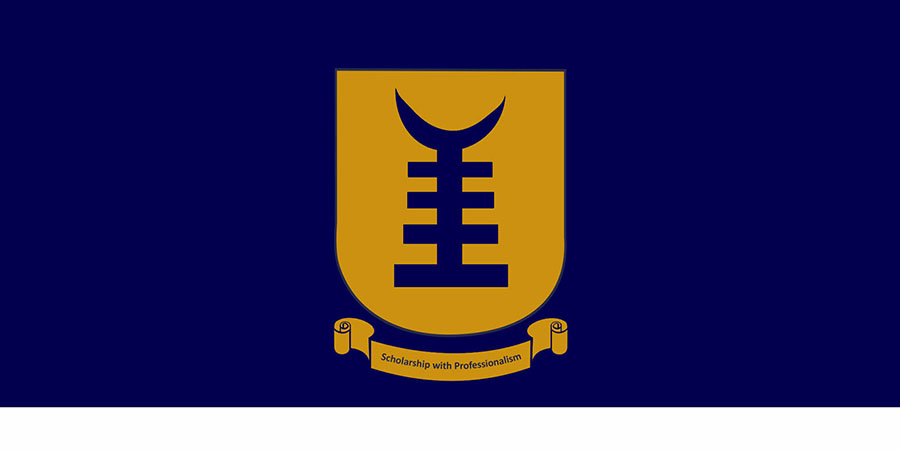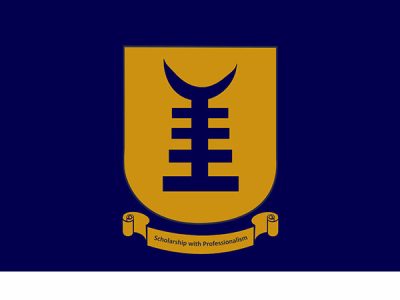Welcome Message from the Coordinator
As the Coordinator for the MA/MPhil in Media and Digital Communications Management, I am excited to welcome you to our programme. In today’s digital age, the role of effective communication strategies cannot be emphasized enough. Our graduate programme will equip you with the necessary knowledge and skills to thrive in this dynamic field. We have carefully curated our curriculum to ensure that you receive a balanced blend of theoretical and practical training. Our faculty members are experts in their respective domains and bring extensive industry experience to the classroom.
As you embark on this journey, I encourage you to seize every opportunity to learn, engage and network. Digital communication is an ever-evolving industry thus keeping abreast of the latest trends and technologies can give you a competitive edge. I look forward to accompanying you on this exciting journey and wish you all the best.
Programme Coordinator’s Profile
Zillah Boye-Doe is a Lecturer with the Department of Communication at the Faculty of Information and Communications Studies. Prior to her appointment, Zillah served as a Graduate Assistant at the School of Graduate Studies, UPSA. She teaches courses such as Public Relations writing, Business Communication and Communication Theories. Her research interests are digital communication, leadership and branding. Miss Boye-Doe holds a Diploma and a Bachelor of Arts in Public Relations Management from the University of Professional Studies, Accra. She also holds a Master of Arts degree in Brands and Communications Management as well as an MPhil in Leadership from UPSA. She serves as the Coordinator for the MA/M.Phil. in Media and Digital Communication Management as well as MSc/ MPhil Information systems
Contact the Coordinator via email: [email protected]
Telephone number: 0209978020
Philosophy of the Programme
The Master of Arts in Media and Digital Communication Management aims to produce graduates and professionals who are on the cusp of what is new and evolving, appreciate how consumers interact with brands online and know the strategies to deploy to win digital publics and customers. This graduate programme seeks to train middle and top-level management personnel in both the private and public sectors of the economy to leverage technology, the media and digital communications to the advantage of their organizations. The comprehensive and industry-relevant curriculum prepares and train students to acquire practical skills required for media planning and management, strategic digital communication and content management. Graduates may take on roles such as Corporate social media strategists, Corporate graphic design managers, Media consultants, Digital media entrepreneurs, Digital communication strategists, Media content creators, Online video/audio editors.
Programme Objectives
The objectives of the MPhil in Media and Digital Communication Management programme are to:
- Equip students with philosophical and theoretical knowledge of the field of digital communication and media management.
- Develop students’ skills and competences to undertake independent research to address skills gap in academia and digital communication related problems in media and industry.
- Train students in the techniques of authentic customer information sourcing and media management.
- Equip students with practical skills to enable them to use relevant computer software for digital communication research and others such as Adobe InDesign and Angular for graphic designing and mobile development.
- Develop students’ digital media entrepreneurial capacity to enable them set up digital communication businesses and venture into related research.
Outcome of the Programme
- Equip students with knowledge and skills in digital media management.
- Train students to prepare, deploy, and manage audio-visual content for online platforms.
- Equip students with the techniques of authentic customer information sourcing and management.
- Prepare a media and digital communication campaign for a firm or organization
- Train students to apply project management principles to execute a virtual consumer, public relations, content creation, or marketing project.
Structure of the Programme
YEAR ONE
SEMESTER ONE
| CODE | COURSES | DESCRIPTION | CREDIT |
| MDCM601 | Writing for the Web | This course is an introduction to the concept and nature of web writing. It will cover the qualities and desirable qualifications of an online news reporter; Characteristics and determinants of online news, the differences between web writing and traditional news writing; Changes in news processes; how to develop the lead and story structure of an online news text; a practical and concise approach to the inverted pyramid style of writing for the web; Writing engaging headlines, blurbs and briefs; New Media Tools for website content creation; Effective strategies for tracking the pattern of web readability; Techniques on applying relevant web links and appropriate content management devices such as the ‘HTML on to the news story;’ Preliminaries of creating a website and practical exercises on web content creation. | 3 |
| MDCM603 | Digital Psychology | The course focuses heavily on heuristic decisions and relates these choices to digital activities. Heuristic decisions can be identified as quick, problem-solving judgements people make without thinking through their next courses of action. Sometimes these decisions lead to cognitive biases or otherwise. Thus people make critical decisions online without thinking them through when they are interacting with technology. Through the application of psychology to behavioural economics and online consumer behaviour, students will be able to understand the course. Theoretical concepts such as aversion loss; reviews and social proofs; the decoy effect and case studies to generate trust and drive sales will be examined. Various concepts and theories such as sensation, perception, motivation, trust, loyalty, emotions and learning that explain brand building while advertising strategies and behavioural design that influence consumer behaviour will also be studied. | 3 |
| MDCM605 | Communication Theories and Models | This course will critically examine the theories that underpin development of the key areas of mass communication. By taking a critical/reflective approach to learning through lectures, seminar presentations and discussions, the course hopes to convey content and perspectives that go against the grain by being, counter-intuitive and critically informed what mass media do, why, how, and with what impact and implications. Models of Communication will also be interrogated. Ultimately, the course seeks to develop and enhance students’ understanding and interpretation of communication theories as well as their ability to apply these theories to their own research inquiries and endeavours. | 3 |
| MDCM611 | Graphics of Communication | It covers a practical study of theories and techniques in the development of camera-ready and laser-printed graphic materials and website distribution material by the use of micro-computer design applications. Content covers layout and design principles including the use of texts, colour and pictures in producing various publications. The course introduces students to various desktop publishing and website design applications aimed at producing materials related to journalism and public relations. Learning can be applied to both Macintosh and Windows platforms. | 3 |
| MDCM613 | Digital Entrepreneurship | The course seeks to equip students with knowledge and skills of how to set up enterprises in the digital space to facilitate effective communication with publics about products, ideas and services of entities. Students will be introduced to technologies such as mobile computing, cloud computing, social media, 3D printing, and data analytics as tools to provide the avenue for them to set up and run businesses to deal with uncertainties. This course also introduces students to the uncommon characteristics of digital technologies and how these can be harnessed to structure entrepreneurial activities. At the end of the course, students will be able to digitally conceptualize, design and implement a business model and apply entrepreneurial approaches, digital technological concepts and tools for venture creation | 3 |
| MDCM615 | Communication Research Methods | The course aims to introduce students to the purpose, philosophy, logic and rules of empirical research on communication phenomena. Special emphasis is placed on the mechanics of social science research including research design, literature review, hypotheses derivation, and data gathering and analysis procedures. The course covers both quantitative and qualitative methods frequently used in communication research, the first part of the course covers qualitative methods and approaches such as first-hand observation, interviews, focus groups, participant-observation, recordings made in natural settings, documents, and artifacts and their analysis while the second phase covers quantitative methods and types such as descriptive, correlational, causal-comparative/quasi-experimental, and experimental research. The course will be taught by two lecturers with expertise in quantitative and qualitative research. Overall, this course should provide students with a hands-on opportunity to develop research proposals for their MPhil study and for real-world research. Upon completion of the course, students should be able to conceptualize, design and conduct communication research. | 3 |
| TOTAL | 18 |
YEAR ONE
SEMESTER TWO
| CODE | COURSES | DESCRIPTION | CREDIT |
| MDCM602 | Media Management | This course provides a global examination of the field of media management with emphasis on major areas of responsibility that fall to managers of media organizations, such as leadership, decision making, motivation, planning, marketing, and strategic management etc. The structure and organization of electronic and print media houses including patterns of ownership, the publishers, financing and manpower of media broadcast organizations, newspaper and magazines are described and analysed in this course. There are case studies of news agencies such as the GNA, PANA, AFP, AP, Reuters and UPI. The course also discusses some public service broadcasting models such as the GBC and commercial FM broadcasting. Decisions of what stories to publish, media regulation, financing and ownership, the role of advertisers in newsrooms and the influence of digital media will be considered. In addition to theories in the field, students will be exposed to practical knowledge and experiences of experts from diverse media and media related establishments such as public relations, advertising, social media and para-media organisations, and creative industries | 3 |
| MDCM604 | Digital Communication Strategy | The digital media landscape moves at a rapid pace, and this course will provide students with a general knowledge of how to manage communication challenges in a tech-centric era. The course will examine the fundamentals of digital communications including blogs, mobile, social networks, community management, and online advertising. Students will learn how to apply relevant strategies and tactics to the business world, and to use an integrated approach when proposing solutions. The course will examine existing and emerging technologies, using trends and case studies to identify best practices. This class will encourage hands-on participation, and students will leave the course with an increased knowledge of practical applications for a successful digital strategy. | 3 |
| MDCM608 | Digital Communication Law and Ethics | This is an intermediate law course designed to give non-law post graduate students understanding of ethical and legal issues that affect media practice and public affairs in the digital milieu of mass communication. This area of scholarship raises controversial questions about moral standards applicable in online (new media) message gathering, production, transmission or consumption. It examines basic legal challenges, defenses and regulation of online platforms as a means of mass communication in the field of news. The course also introduces students to the Ghanaian constitution, legal system, electronic communication laws, electronic platforms, and fundamental freedoms such as free speech and freedom of the media, privacy and protection of reputation, in both traditional and digital media environments. From an ethics perspective, questions relating to internet communication media such as online journalism, blogging, digital photojournalism, citizen journalism, social media and issues pertaining to security, privacy, fake news, information overload, cyberbullying, internet addiction and digital divide will also be addressed. | 3 |
| MDCM612 | Digital Communication Practicum | Students shall be taken through series of seminars on selected digital communication areas, workshops delivered by digital industry players and group discussions. At the end of the sessions, students shall be required to undertake practical research on a chosen project in Media and Digital Communications and write out a 10-page brief of a project that is to complement and explain a practical project they are to demonstrate and showcase for grading. The font size is 12 with Times New Roman. Students are expected to use the APA referencing style | 3 |
| MDCC616 | New Media and Corporate Communication | This course aims to expose students to how corporate communications functions can be enhanced with useful new media tools, including blogging, Twitter, social networking, podcasting and online video. More importantly, students will apply what they learn by developing a social media plan for a company or organisation that they choose. Each week, students will learn how to use a different social media tool to engage in conversations that help to tell their stories. Students will also learn how to effectively use new media in advocacy campaigns. They will be equipped with the knowledge that will enable them to not just answer, but inspire, the question of why organisations should care about new/social media. | 3 |
| Electives (Choose any one) | |||
| MDCM614 | Web and Mobile Applications | This module seeks to develop and enhance web development and programming skills by focusing upon issues and techniques specific to the delivery of content and applications for mobile platforms. This course introduces students to programming technologies, design and development related to these applications. Students will study and gain experience with the languages and frameworks that are most commonly used in developing these applications. They will also learn fundamental principles of Web and mobile development so that they will be prepared to work with current and emerging technologies. | 3 |
| MDCM616 | Human Computer Interaction | The course introduces students to the fundamental concepts of human-computer interaction and user centered design thinking, through working in teams on an interaction design project, supported by lectures, readings, and discussions. They will learn to evaluate and design usable and appropriate software based on psychological, social, and technical analysis. They will become familiar with the variety of design and evaluation methods used in interaction design, and will get experience with these methods in their project. Topics will include usability and affordances, direct manipulation, systematic design methods, user conceptual models and interface metaphors, design languages and genres, human cognitive models, physical ergonomics, information and interactivity structures, and design tools and environments | 3 |
| TOTAL | 18 |
Course Features
- Lecture 0
- Quiz 0
- Duration 10 weeks
- Skill level All levels
- Language English
- Students 0
- Assessments Yes




